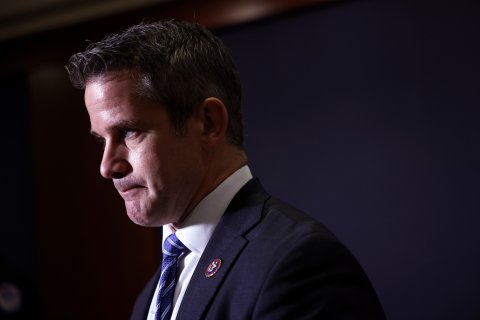Republican Congressman Adam Kinzinger of Illinois didn't pull any punches when he talked to Newsweek about the White House walking back Joe Biden's call from Warsaw on March 26 that Vladimir Putin should be removed from power.
"I would've fired everybody that clarified my statement for me," he said. "I would have done that that day if I was president, because I think even if Joe Biden had not intended to say that or for it to come across as it did, you know, the White House had a decision to make, they could have, they either could make him look weak, which is what they ultimately chose to do."
"Or they could have said, 'okay, well, we wish he wouldn't have said it, but let's just go with it,'" he added. "And we can clarify that he doesn't mean that the United States [should] do regime change, but, you know, look, if he's gone, he's gone.'"
Kinzinger joined host Naveed Jamali on Newsweek's podcast Declassified for a candid discussion of today's political issues — with Ukraine at the top of the list.
Kinzinger would like to see the U.S. give a lot more of the lethal aid that President Zelensky is requesting — and he says we're being too fearful.
"I think we need to get past our fear of escalation," he said, "in terms of what we're helping them with. Ukraine should have anti-shipping missiles. Ukraine should have drones that aren't switchblade drones."
While America's response to the war in Ukraine has united Congress around several bipartisan objectives, the conflict has also exposed ideological splintering among the two parties, as America's far-left and far-right divulge from the consensus.
"Squad" members Cori Bush (D-Mo.) and Ilhan Omar (D-Minn.) recently joined Trump loyalists Marjorie Taylor Greene (R-Ga.), Matt Gaetz (R-Fla.), Madison Cawthorn (R-N.C.), and 12 other Republicans in voting against the Russia oil ban, leaving the vote at 414-17.
For the progressives, the move was allegedly about curbing the harm that the potential sanctions could have on the Russian people. For the Republicans, this vote mirrors past stances the party's far-right wing has taken as part of a Trump-led agenda to adopt a friendlier posture toward to Russia.
"Without correcting course, there will be a moment at which I say, 'OK, I'm no longer a Republican,'" Kinzinger, who has been one of his party's leading Trump critics, told Newsweek.
"I'm not a Democrat, by the way," he added, "because the Democrats are going even further left, and I'm just not that. But I certainly would not feel like a Republican if it stays like this."

Representatives such as Greene and Cawthorn have at times appeared to use similar language to that used by President Vladimir Putin to justify his invasion of Ukraine, which the West has deemed to be unprovoked.
Greene echoed Putin's false claim of Nazis being the reason for the invasion, saying, "We should not spend billions of American's hard earned tax dollars on lethal aid to be given to possible Nazi militias."
Cawthorn has said "propaganda is being used to entice America into another war," claiming that the Ukrainian government "has been pushing woke ideologies."
Kinzinger told Newsweek that the rise of figures like Greene and Cawthorn are a product of a time in which America finds itself without a common enemy, where rallying one's political base has come to revolve around attacking political enemies at home rather than those abroad.
"We (could) all agree that the Soviet Union was bad. I think what happened is the Soviet Union fell. We lost our common enemy," Kinzinger told Newsweek. "You have people that turn fire entirely into the inside, and they call both the media or the Democrats or Republicans, the enemy, and not, you know, the actual enemy."
With the former president taking partisan political attacks to levels unprecedented in modern America, the bar has been raised over what actions will garner political attention. Kinzinger says that as this behavior has brought certain individuals media attention and donor dollars, it has become a blueprint for others to follow.
"As somebody that wants to be famous, you're like, how can I say the most outrageous thing?" Kinzinger said. "I think money in the political system is a huge problem because people have to be more and more outrageous to be more and more famous, to raise more and more money."

This phenomenon has come to affect the larger electorate in a matter beyond just those who carry extreme views. An article published by PEW Research President Michael Dimock argues that divisions have intensified to levels seen today as "identities have become 'stacked' on top of people's partisan identities.
A Quinnipiac University poll found that 66% of Republicans favor a ban on Russian oil, while a separate Marquette Law School Poll reported that 55% of Republicans favor overturning Roe V. Wade. For a voter with strong feelings about abortion that serve as part of their religious identity, supporting an anti-abortion candidate like Greene could make sense, despite her positions on Russia, especially as fewer Democrats are offering anti-abortion positions.
Kinzinger said voters have become fearful about being shunned from their respective voting blocs if they go against certain positions, even those that are extreme. As party positions have increasingly become more sharply drawn, Kinzinger said he's seen certain people appear to shift their beliefs to fit in with their broader political cohort.
"I was watching a focus group the other day of Republican kind of MAGA types, and you would see somebody say, 'How many of you think the 2020 election was stolen?' Kinzinger said. "Three people in that group would not raise their hand initially until they looked around and saw everybody else's hand raised, and so, they'd raise their's as well."
While for some issues, this division may be confined to conflict at home, Kinzinger said division on the world stage can put America at a disadvantage when dealing with its adversaries, as the autocratic regimes of China and Russia are able to act swiftly with little or no concern for dissenting party members.
These countries are able to wield disinformation to further political divisions within the nation, Kinzinger notes, allowing them to gain certain advantages despite boasting lesser technology and economic power in certain areas. Kinzinger said for America to combat this, it must learn to agree on certain basics that will allow it to execute, in a unified manner, long-term plans.
He said that the key to accomplishing this lies in teaching basic civic values across the nation's school systems.
"We have to look at foreign policy, not just as, as government members, but as people, as Americans," Kinzinger told Newsweek. "Let's go back to kind of teaching basics."
"The bottom line is, if you can start doing that and you can put out that vision for the people, it makes a difference," he added.











